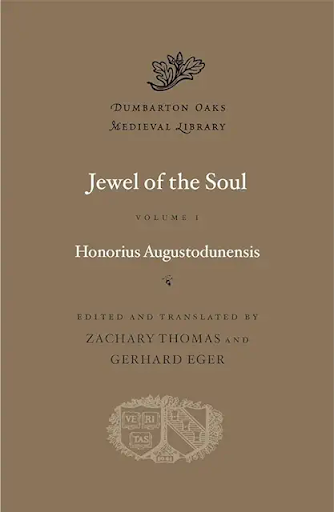Augustodunensis, Honorius, Jewel of the Soul, Zachary Thomas and Gerhard Eger (ed and trans), 2 vols, Dumbarton Oaks Medieval Library, Harvard University Press, Cambridge, Mass, 2023 (US $34 per volume).
I wanted to alert readers, in case you haven't already come across it, to the availability of a newly published translation of a wonderful twelfth century commentary on the liturgy, Jewel of the Soul.
Jewel of the Soul (Gemma Animae) is one of a number of medieval liturgical commentaries which now becoming more accessible through either Latin editions or translations (or in this case both). Others available in English include Dunbarton Oakes edition of Amalarius of Metz' On the Liturgy, and William Durand's Rationale (from the Corpus Christianorum in translation series).
Liturgy as Scriptural interpretation
Most of these texts share a common approach to the Mass and Office, namely that the liturgy is a form of Scriptural and theological interpretation, embodying deep symbolic meanings.
The traces of the idea that the various forms of the Office, for example, are not simply mechanistic constructions (as most twentieth century liturgists would suggest) but rather reflect particular theological ideas (and in the case of monastic offices, particular distinctive charisms) can be found in many early Patristic and monastic sources, as well as several Western and Eastern saints' lives.
The fourth century pilgrim-nun Egeria, for example, commented on the particular aptness of the psalms chosen for the weekly Jerusalem Resurrection of Office which spanned Saturday night into Sunday morning. St Cyprian (and many others) provided assorted rationales for the timing of particular hours of the Office, and the number and choice of at least some of the psalms said at them. And a number of early medieval saints lives from both the East and West draw attention to the reasons for the choice of particular forms of the Office and related psalm practices.
Most of the surviving early descriptions of various forms of the Office though, such as the Rules of St Augustine, Shenoute, Caesarius of Arles, Benedict and the Master, are more concerned with providing instructions on what to say and when, rather than setting out a rationale for the particular choices made.
Jewel of the Soul
Jewel of the Soul, and other texts like it, then, represent later attempts to fill in this gap, and help the reader understand the deeper meanings implicit in the design of the liturgy.
Like Amalarius' wonderful work, Jewel of the Soul covers both the Mass and Office (as well as related topics), and while primarily focused on the Roman Office, includes quite a bit of commentary on the Benedictine.
Jewel builds on, but goes rather further than Amalarius in his allegorical explanations. To illustrate this, here is an extract on the Benedictine Office (Bk I, ch 65, On the Monastic Cursus):
One may ask why St. Benedict ordered the hours for monks in a way that differs from the custom of the Church, and why the eminent pope Gregory approved this order with his authority. In my opinion, what is intended in this most wise distribution of the Psalms made by that man “full of the spirit of all the saints,” is that the contemplative life should be distinguished from the active life by office just as by habit, and by this privilege the observance of monastic discipline is to be commended. So St. Gregory, endowed with all wisdom, seeing that that “man full of God” had ordered all these things by this principle, duly confirmed them by his own authority. Though he altered the psalms, he ordered the office with the same meaning in mind. For because we work for six days in this life, just as mankind has worked for six ages in the vineyard, and just as we rest on the Lord’s day, so in the seventh age we will receive the denarius of eternal life. For this reason he is thought to have instituted the psalms of Prime for the six days of the week which tell of the just men], who worked in the Lord’s vineyard throughout six ages of the world, as if for various hours of the day (Matthew 20).
The particular allegorical meanings the Jewel ascribes to the liturgy are of course, entirely contestable: many will seem a stretch to modern minds! Nonetheless, their spiritual value, I think, comes from helping us get into a mindset of meditating on the liturgy and all of its components.
The new translation
The new translation of the Jewel of the Soul can actually be found in draft form on the excellent Canticum Solomonis blog (though you will have to search for the sections covering the Office, as it is not well-indexed there), but having it in print form is a wonderful step forward.
The Dumbarton Oaks editions are generally very nicely put together, and this is no exception. They also have the enormous advantage of providing the Latin and English texts in parallel.
The limitations of the work are that it is not, unfortunately based on a critical edition, but rather largely based on a choice of one manuscript, and the text notes (provided at the end) identify most of the Scriptural references, but not (in the main) the other sources it draws on.
But these are minor quibbles - I'd far rather have an accessible edition of the Latin (beyond Patrologia Latina) and translation of this and other similar works than wait many more years for someone to map out variants in the seventy two or more surviving manuscripts!
Please do consider buying it.

No comments:
Post a Comment